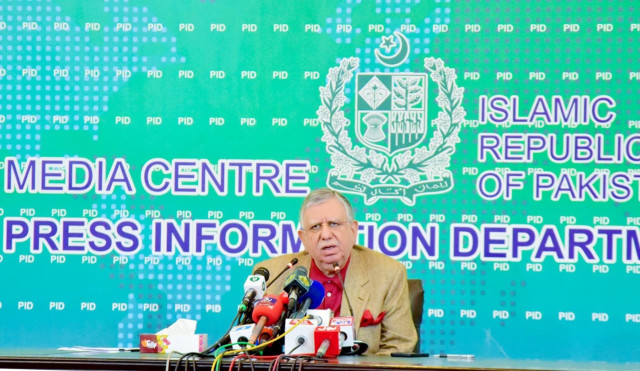PM should have avoided public EU bash: Tarin
Minister hopes IMF will not have objections over Rs246b relief package

Finance Minister Shaukat Tarin on Wednesday said Prime Minister Imran Khan should not have reacted “publicly” against the European Union in his recent speech where he lashed out at the bloc’s ambassadors for their statement, asking Pakistan to condemn Russia for its invasion of Ukraine.
But Tarin said that we should not worry about what the EU will do. Tarin said that the EU had remained silent on India's violations of UN resolutions and international law and that “Pakistan had just abstained from voting in the UN General Assembly session on Russia”.
The minister said that the EU should not tell Pakistan what to do and that it was the right of the prime minister to protect his country and its prestige.
He maintained that Pakistan had an independent foreign policy which stipulated that no country should violate the other country’s sovereignty and that disputes be settled peacefully.
He said that the International Monetary Fund should not have any problems with the Rs246 billion relief package announced by Prime Minister Imran Khan and instead it should show leniency in its conditions to prevent people from coming on the streets.
Tarin said that the government conversed with the IMF about the “necessary” parts of the relief package, suggesting the government had announced the package after getting it endorsed from the IMF.
While addressing a news conference, Tarin also admitted that the prime minister should not have publicly reacted against the European Union over the issue of Ukraine but hastened to add that no one has the right to dictate Pakistan on its foreign policy.
Tarin spoke about a number of issues, including the IMF programme, Pakistan’s relations with China and the EU and the prime minister’s relief package.
Read Arresting the soaring trade deficit
“We consulted with the IMF about the PM’s relief package only to the extent of what was necessary,” said Tarin, while responding to a question.
Tarin’s statement marks a departure from the standard practice of taking prior consent of the lender agency on an issue as big as the Rs246 billion relief package that is bound to hit may targets agreed with the IMF under the sixth review of its programme for Pakistan under the Extended Fund Facility (EFF).
Tarin added that the IMF should not have problems with the relief package, as Pakistan was neither increasing its fiscal deficit nor taking any loans to provide relief to the people. He said the government was able to announce subsidies on the back of improved revenue collection.
However, he admitted that as against the IMF requirement of having nominal primary budget surplus, there could be primary budget deficit of half a percentage of GDP by the end of the current fiscal year.
He said it was not a concern of the IMF but "it is the responsibility of the government to apprise them of such decisions including the looming political instability as well."
He also dispelled an impression that the relief package was announced for "political reasons," saying the government was cognisant of burgeoning prices and hence it decided to formulate a plan to provide relief to the masses.
He denied that the government was laying landmines for the next government, claiming that current account deficit and foreign reserves would not be as bad as was the situation at the end PML-N’s tenure.
The finance minister explained that for the package, the government extracted some amount from the Ehsaas Programme allocations and the Covid budget, adding that “we also have Rs1.2 trillion undistributed dividends from state-owned enterprises and Rs200 billion can be withdrawn from there for the relief package.
Tarin said the PM’s relief package would cost an additional Rs110 billion due to a reduction in fuel prices and Rs136 billion is the cost of the Rs5 per unit reduction in the electricity prices, bringing the total impact to Rs246 billion.
However, the Economic Coordination Committee (ECC) of the cabinet had approved Rs106 billion electricity relief subsidy as it did not agree giving a subsidy to commercial consumers having above 5kV connections and also excluded the fuel price adjustment from the relief.
To a question about the rationale for announcing tax amnesty every year, Tarin said that there should not be a general tax amnesty but the prime minister’s third tax amnesty scheme was “targeted and ring-fenced”.
Tarin said that the economy was improving and trade deficit narrowed significantly due to reduction in the imports in January and February. He said that the current account deficit was expected to decline in the remaining months of the fiscal year.
The CAD reported by the SBP is higher due to some imports not reflected at PBS data due to the sensitive nature but recorded by EAD. Importantly, the import differential is funded, according to the Finance Ministry.
The minister also said that inflation was lower at 12.2% as compared with 13% in January. Adjusted with tomatoes prices the inflation in February would have been 10.8% on yearly basis.
Read more PM Office seeks Rs200b to offset inflation impact
He also said foreign investors were considerably satisfied with the measures taken by the government to facilitate businesses, however, they have sought a little more improvement as well, which we are working on.
But the minister said that the political noise was creating distraction. “The opposition knows that the government’s pro-people policies like Kamyab Pakistan Programme and Sehat Shaulat card would close the doors on the opposition permanently and this is the only time when it can cause some problem,” he added.
Pak-EU relations
To a question about $21 billion bailout package from China, the minister said that the issue was not discussed during Imran Khan’s meetings with the top Chinese leadership. He said that the government also discussed with China their investment plans and future roadmap for Pakistan.
Pakistan sought Chinese support in sectors including industries, agriculture, information technology sectors and trade.



















COMMENTS
Comments are moderated and generally will be posted if they are on-topic and not abusive.
For more information, please see our Comments FAQ